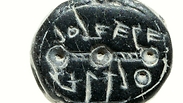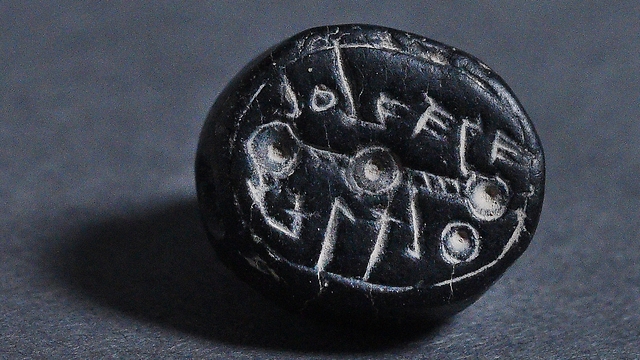
Woman's seal from First Temple discovered
A rare 2500-year-old seal inscribed with the name of 'Elihana bat Gael' in ancient Hebrew letters was unearthed at the City of David in the Jerusalem Walls National Park.
A rare 2,500-year-old seal bearing the name of a woman, Elihana bat Gael, has recently been discovered in an Israel Antiquities Authority excavation at the City of David in the Jerusalem Walls National Park.
The seal was found in a large building from the First Temple period. According to the IAA archeologists, “The owner of the seal was exceptional compared to other women of the First Temple period: she had legal status which allowed her to conduct business and possess property."
Another seal belonging to a man named Sa‘aryahu ben Shabenyahu was found nearby.

“Finding seals that bear names from the time of the First Temple is hardly a commonplace occurrence, and finding a seal that belonged to a woman is an even rarer phenomenon”, said the IAA archeologists.
After nine years of excavation done by the IAA, in cooperation with the Israel Nature and Parks Authority and the City of David Foundation, archeologists were able to reach the layers of ancient Jerusalem from the First Temple period. The seals were found inside the structure, built out of magnificent ashlars.
“Personal seals, such as those of Elihana and Sa‘aryahu, were used for signing documents, and were frequently inlaid as part of a ring that was worn by the owner. In the ancient times, the seals marked the identity, genealogy and status of the owner of the seal,” Dr. Doron Ben-Ami, Yana Tchekhanovets and Salome Cohen, excavation directors on behalf of the IAA explained.
On the rare woman’s seal appears the mirror-writing of “to Elihana bat Gael,” inscribed in ancient Hebrew letters. The female owner of the ring is mentioned here together with the name of her father.
According to Dr. Hagai Misgav of Hebrew University in Jerusalem, “Seals that belonged to women represent just a very small proportion of all the seals that have been discovered to date. This is because of the generally inferior economic status of women, apart from extraordinary instances such as this. Indeed, the name Elihana does not appear in the Bible, and there is no other information regarding the identity of the woman, but the fact that she possessed a seal indicates on her high social status”.
Dr. Misgav added that “most women’s seals that are known to us bear the name of the father rather than that of the husband. Here, as in other cases, this might indicate the relatively elevated status of Elihana, which depended on her original family, and not on her husband’s family. It seems that Elihana maintained her right to property and financial independence even after her marriage and therefore her father’s name was retained; however, we do not have sufficient information about the law in Judah during this period."
The name Eliha is known from a contemporary Ammonite seal and is the feminine form of the name Eli, known from the Bible. The script appearing on the seal is remarkably similar to the script on Ammonite seals, and this might indicate the foreign origin of the artisan who carved the seal and possibly the foreign origin of Elihana, who apparently came from east of the Jordan River.
The second seal that was unearthed in the excavation was also in mirror-writing and bears the inscription “to Sa‘aryahu ben Shabenyahu”. The name Sa‘aryahu appears on a sherd from Arad, and apparently means “the Lord, which was revealed in a storm” (Job 38).










